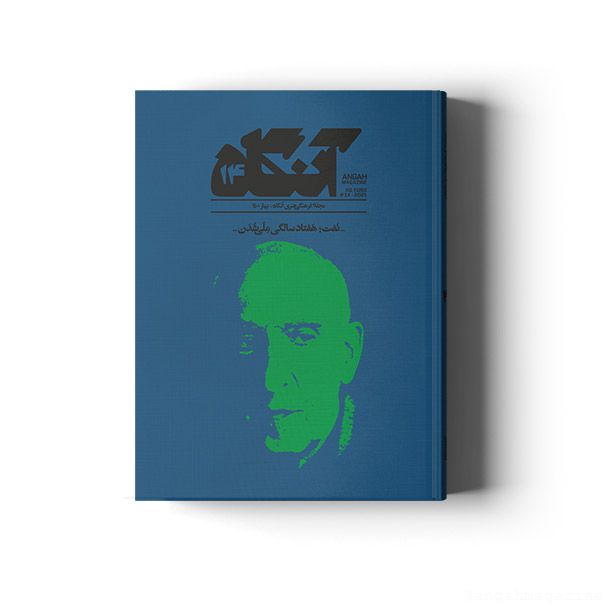10 years of oil
In the spring of 2021, the fourteenth issue of Angah magazine was published, with the subject “Oil; 70th anniversary of nationalization”. An illustration by Iman Safaei of Mosaddegh is on the cover of this issue.Oil was chosen as the subject of this issue for a variety of reasons, which the magazine seeks to address in each article. But the most crucial is to examine the impacts of nationalization of the petroleum industry on Iranian life and culture 70 years later.

Freydoun Majlesi analyses the evolution of the petroleum industry throughout time in the first article without passing judgment. Hamidreza Mohammadi interviews Parviz Mina, a board member of the National Iranian Oil Company and an expert on the oil industry’s oral history.
Naser fokouhi analizez the consequences of oil revenues on the culture of iran and writes: “The increase in oil revenues in the second half of the 1970s resulted in a significant change in the lifestyle of a small portion of the urban population of Iran’s major cities, with the external manifestation of extreme consumerism and imitation of Western everyday life models without further Iranian preparation. “Despite their improving standard of living, they felt a terrible sense of losing indigenous identities at the same time as a very wide class disparity in access to oil profits, a sentiment that easily drove them to an insurgent posture.”
Interviews with Gholamhossein Hasasntash, Farshad Momeni, Hamzeh Farhadi can be read in this issue. It is also possible to read articles on the role of women in the oil industry, such as Farzaneh Ghobadi’s “The Struggle with Glass Roofs,”. Angah didn’t forget about the effects of black gold on literature, film, manufacturing, and business, which is covered in various articles. Memoirs of Fouad Rouhani, the history and background of oil, oil in the press, and oil and art are among the other interesting topics covered in the fourteenth issue. Readers may access this 256-page issue, which includes enjoyable notes and articles.
Table Of content
7 .Editorial> Arash Tanhai
8.Foreigners; Servants or traitors> Fereydoun Majlesi
26. I miss Iran, Interview with Parviz Mina> Hamidreza Mohammadi
36. Iran’s petroleum from Darsi to consortium> Farzaneh Ebrahimzadeh
48. Consequences of oil revenues on the culture of iran> Naser Fokouhi
56. To be or not to be; to stay or not to stay, Conversation with Bijan Namdar Zanganeh> Hadi Heydari, Soshiant Shojaeifard
66. Oil, intermediary link between Fasih and Khuzestan> Hamidreza Shokouhi
72.Oil derivatives adversities> Reza Saaki
80. A branch is growing, Interview with Ahmadmirza> Katayoun Arghaei
86.Turn on the lights> Zahra Abbasali
92. See how they preserved the oil desert> Elham Ahmadpour
96.Men of black gold land> Amirreza Mohammadi
104.Oil and our daily routine> Banousheh Farhat
106. To black colour, to colourless fortune> Farzad Moghadam
112.Struggle with glass roofs> Farzaneh Ghobadi
118.Sound of music from oil barrel> Majid Ahmadinia
122.The first Opec term and its Iranian secretary general> Mahdi Norooz
128. Exclusive cinema> Rasoul Nazarzadeh
140. American gained a foothold in Iran. Interview with Masoud Forouzandeh> Mina Ali Islam
150.When did oil come and go…> Mohsen Mousavi Mirkalaei
158.Definite bitter fate > Ahmad Abolfathi
162.Oil is breechers for the masses..> Seyyed Emadoldin Ghoreishi
178.Ifs and buts of opportunism, Interview with Majid Tafaroshi> Mina Ali Islam
186
Oil Curses; From expectation to Inefficiency and corruption, Interview with Gholamhossein Hasasntash
> Hamidreza Shokouhi
190
Transparency, cure for economic rent of petroleum, Interview with Farshad Momeni
> Ali Nili
200
The beauty of fire has risen
> Marjan Mahjoub
204
Press oil articles
> Seyyed Farid Ghasemi
206
Trip to Iran
> Reza Mo’aterian
212
A few lost lights flickers
> Fateh Sahba
228
Earth’s veins, our veins
> Hossein Ganji
236
I’m from Khuzestan and I love the oil, Interview with Hamzeh Farhadi
> Arash Tanhai
246
A mellow and middle aged face
> Sajad Baghban Maher and Zarvan Rouhbakhshian
